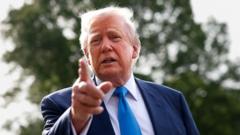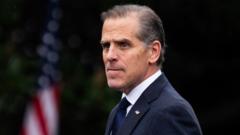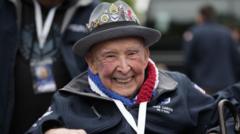Plans are officially in motion for a grand military parade on June 14, which marks both the US Army's milestone and President Donald Trump's 79th birthday. In what the Pentagon terms a "day-long festival," the event will showcase 6,600 soldiers along with 150 military vehicles and 50 aircraft, all set against the backdrop of Washington D.C.'s National Mall. The military parade, a concept initially proposed by Trump during his first term, had been shelved due to an estimated cost of $90 million.
Military Parade Scheduled for Trump's Birthday: A Celebration of the US Army

Military Parade Scheduled for Trump's Birthday: A Celebration of the US Army
The US Army's 250th anniversary parade coincides with President Trump's birthday, raising eyebrows and sparking political chatter.
Moreover, Trump is introducing discussions to rename Veterans Day to "Victory Day for World War I," aiming to honor American contributions to the war, despite the lack of an executive order to formalize the change. While he continues to push for commemorative recognitions, including the potential naming of VE Day as "Victory Day for World War II," the details remain ambiguous, as such changes require Congressional approval.
White House press secretary Karoline Leavitt later clarified that Veterans Day will continue to be honored, stretching the narrative surrounding the newly proposed commemorative days and raising questions about their official recognition. As we approach the anniversary, debates around these festivities, their implications, and the historical context they present highlight the ongoing struggle to remember and celebrate military history in the United States.
While countries like Russia and others celebrate Victory Day with massive parades, discussions around how the United States honors these historical events continue to evolve. The upcoming parade, therefore, stands not just as a military celebration, but also as a reflection of Trump's enduring influence on national commemorative practices.
In addition to these happenings, the debate continues regarding the proper remembrance of American sacrifices in both world wars, keeping the discourse on military history alive and relevant as the nation reflects on its past.
With the Army's significant anniversary upon us, questions remain as to how these celebrations will shape national identity and historical consciousness for years to come.
White House press secretary Karoline Leavitt later clarified that Veterans Day will continue to be honored, stretching the narrative surrounding the newly proposed commemorative days and raising questions about their official recognition. As we approach the anniversary, debates around these festivities, their implications, and the historical context they present highlight the ongoing struggle to remember and celebrate military history in the United States.
While countries like Russia and others celebrate Victory Day with massive parades, discussions around how the United States honors these historical events continue to evolve. The upcoming parade, therefore, stands not just as a military celebration, but also as a reflection of Trump's enduring influence on national commemorative practices.
In addition to these happenings, the debate continues regarding the proper remembrance of American sacrifices in both world wars, keeping the discourse on military history alive and relevant as the nation reflects on its past.
With the Army's significant anniversary upon us, questions remain as to how these celebrations will shape national identity and historical consciousness for years to come.




















